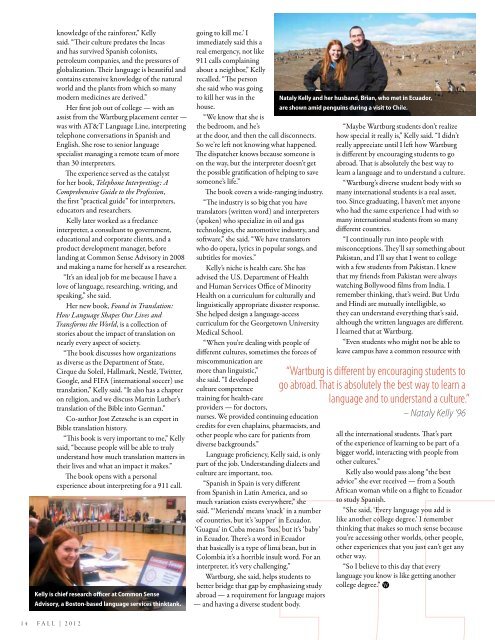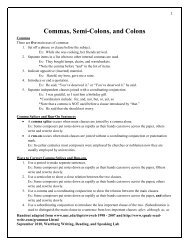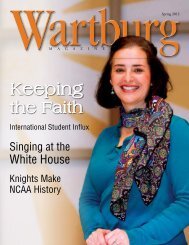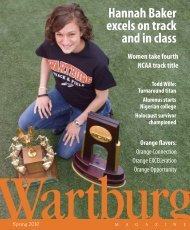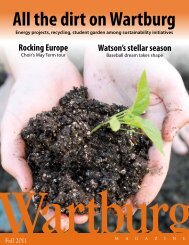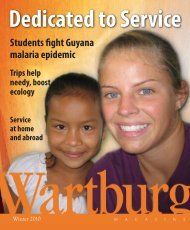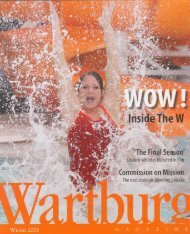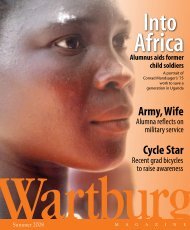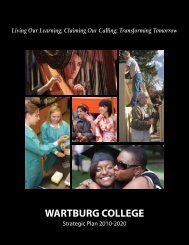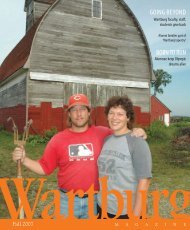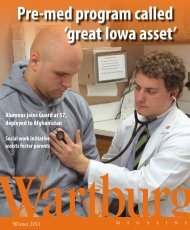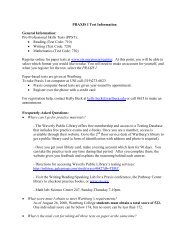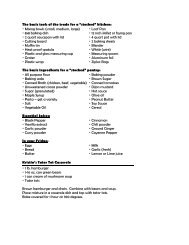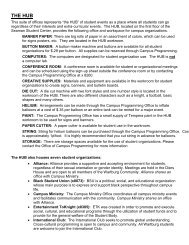You also want an ePaper? Increase the reach of your titles
YUMPU automatically turns print PDFs into web optimized ePapers that Google loves.
14 FALL | 2012<br />
knowledge of the rainforest,” Kelly<br />
said. “Their culture predates the Incas<br />
and has survived Spanish colonists,<br />
petroleum companies, and the pressures of<br />
globalization. Their language is beautiful and<br />
contains extensive knowledge of the natural<br />
world and the plants from which so many<br />
modern medicines are derived.”<br />
Her first job out of college — with an<br />
assist from the <strong>Wartburg</strong> placement center —<br />
was with AT&T Language Line, interpreting<br />
telephone conversations in Spanish and<br />
English. She rose to senior language<br />
specialist managing a remote team of more<br />
than 30 interpreters.<br />
The experience served as the catalyst<br />
for her book, Telephone Interpreting: A<br />
Comprehensive Guide to the Profession,<br />
the first “practical guide” for interpreters,<br />
educators and researchers.<br />
Kelly later worked as a freelance<br />
interpreter, a consultant to government,<br />
educational and corporate clients, and a<br />
product development manager, before<br />
landing at Common Sense Advisory in 2008<br />
and making a name for herself as a researcher.<br />
“It’s an ideal job for me because I have a<br />
love of language, researching, writing, and<br />
speaking,” she said.<br />
Her new book, Found in Translation:<br />
How Language Shapes Our Lives and<br />
Transforms the World, is a collection of<br />
stories about the impact of translation on<br />
nearly every aspect of society.<br />
“The book discusses how organizations<br />
as diverse as the Department of State,<br />
Cirque du Soleil, Hallmark, Nestlé, Twitter,<br />
Google, and FIFA (international soccer) use<br />
translation,” Kelly said. “It also has a chapter<br />
on religion, and we discuss Martin Luther’s<br />
translation of the Bible into German.”<br />
Co-author Jost Zetzsche is an expert in<br />
Bible translation history.<br />
“This book is very important to me,” Kelly<br />
said, “because people will be able to truly<br />
understand how much translation matters in<br />
their lives and what an impact it makes.”<br />
The book opens with a personal<br />
experience about interpreting for a 911 call.<br />
“I heard a woman whispering, ‘He’s<br />
Kelly is chief research officer at Common Sense<br />
Advisory, a Boston-based language services thinktank.<br />
going to kill me.’ I<br />
immediately said this a<br />
real emergency, not like<br />
911 calls complaining<br />
about a neighbor,” Kelly<br />
recalled. “The person<br />
she said who was going<br />
to kill her was in the<br />
house.<br />
“We know that she is<br />
the bedroom, and he’s<br />
at the door, and then the call disconnects.<br />
So we’re left not knowing what happened.<br />
The dispatcher knows because someone is<br />
on the way, but the interpreter doesn’t get<br />
the possible gratification of helping to save<br />
someone’s life.”<br />
The book covers a wide-ranging industry.<br />
“The industry is so big that you have<br />
translators (written word) and interpreters<br />
(spoken) who specialize in oil and gas<br />
technologies, the automotive industry, and<br />
software,” she said. “We have translators<br />
who do opera, lyrics in popular songs, and<br />
subtitles for movies.”<br />
Kelly’s niche is health care. She has<br />
advised the U.S. Department of Health<br />
and Human Services Office of Minority<br />
Health on a curriculum for culturally and<br />
linguistically appropriate disaster response.<br />
She helped design a language-access<br />
curriculum for the Georgetown University<br />
Medical School.<br />
“When you’re dealing with people of<br />
different cultures, sometimes the forces of<br />
miscommunication are<br />
more than linguistic,”<br />
she said. “I developed<br />
culture competence<br />
training for health-care<br />
providers — for doctors,<br />
nurses. We provided continuing education<br />
credits for even chaplains, pharmacists, and<br />
other people who care for patients from<br />
diverse backgrounds.”<br />
Language proficiency, Kelly said, is only<br />
part of the job. Understanding dialects and<br />
culture are important, too.<br />
“Spanish in Spain is very different<br />
from Spanish in Latin America, and so<br />
much variation exists everywhere,” she<br />
said. “‘Merienda’ means ‘snack’ in a number<br />
of countries, but it’s ‘supper’ in Ecuador.<br />
‘Guagua’ in Cuba means ‘bus,’ but it’s ‘baby’<br />
in Ecuador. There’s a word in Ecuador<br />
that basically is a type of lima bean, but in<br />
Colombia it’s a horrible insult word. For an<br />
interpreter, it’s very challenging.”<br />
<strong>Wartburg</strong>, she said, helps students to<br />
better bridge that gap by emphasizing study<br />
abroad — a requirement for language majors<br />
— and having a diverse student body.<br />
“Maybe <strong>Wartburg</strong> students don’t realize<br />
how special it really is,” Kelly said. “I didn’t<br />
really appreciate until I left how <strong>Wartburg</strong><br />
is different by encouraging students to go<br />
abroad. That is absolutely the best way to<br />
learn a language and to understand a culture.<br />
“<strong>Wartburg</strong>’s diverse student body with so<br />
many international students is a real asset,<br />
too. Since graduating, I haven’t met anyone<br />
who had the same experience I had with so<br />
many international students from so many<br />
different countries.<br />
“I continually run into people with<br />
misconceptions. They’ll say something about<br />
Pakistan, and I’ll say that I went to college<br />
with a few students from Pakistan. I knew<br />
that my friends from Pakistan were always<br />
watching Bollywood films from India. I<br />
remember thinking, that’s weird. But Urdu<br />
and Hindi are mutually intelligible, so<br />
they can understand everything that’s said,<br />
although the written languages are different.<br />
I learned that at <strong>Wartburg</strong>.<br />
“Even students who might not be able to<br />
leave campus have a common resource with<br />
“<strong>Wartburg</strong> is different by encouraging students to<br />
go abroad. That is absolutely the best way to learn a<br />
language and to understand a culture.”<br />
– Nataly Kelly ‘96<br />
all the international students. That’s part<br />
of the experience of learning to be part of a<br />
bigger world, interacting with people from<br />
other cultures.”<br />
Kelly also would pass along “the best<br />
advice” she ever received — from a South<br />
African woman while on a flight to Ecuador<br />
to study Spanish.<br />
“She said, ‘Every language you add is<br />
like another college degree.’ I remember<br />
thinking that makes so much sense because<br />
you’re accessing other worlds, other people,<br />
other experiences that you just can’t get any<br />
other way.<br />
“So I believe to this day that every<br />
language you know is like getting another<br />
college degree.”


